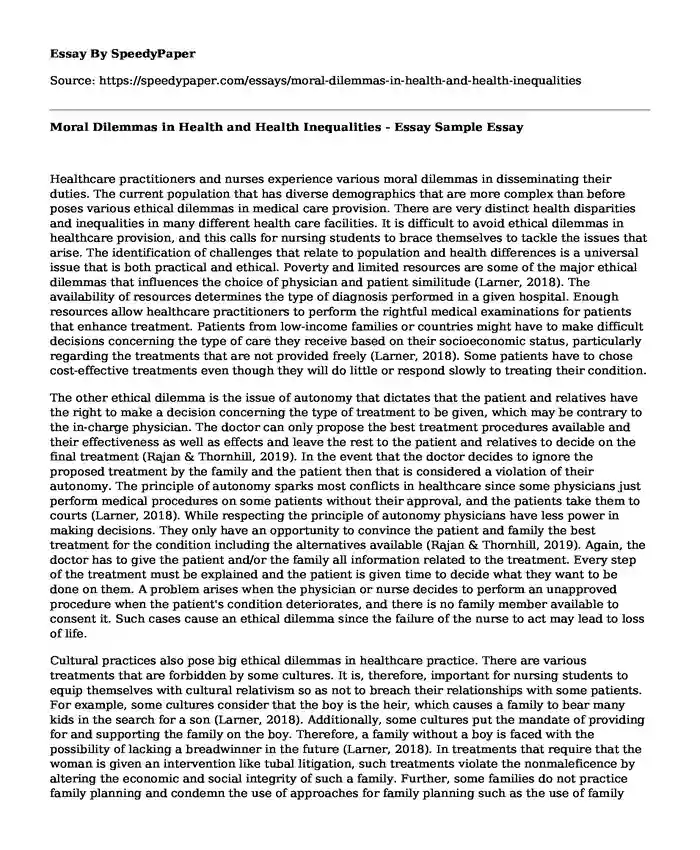
| Type of paper: | Essay |
| Categories: | Ethics Healthcare Ethical dilemma Moral development |
| Pages: | 3 |
| Wordcount: | 678 words |
Healthcare practitioners and nurses experience various moral dilemmas in disseminating their duties. The current population that has diverse demographics that are more complex than before poses various ethical dilemmas in medical care provision. There are very distinct health disparities and inequalities in many different health care facilities. It is difficult to avoid ethical dilemmas in healthcare provision, and this calls for nursing students to brace themselves to tackle the issues that arise. The identification of challenges that relate to population and health differences is a universal issue that is both practical and ethical. Poverty and limited resources are some of the major ethical dilemmas that influences the choice of physician and patient similitude (Larner, 2018). The availability of resources determines the type of diagnosis performed in a given hospital. Enough resources allow healthcare practitioners to perform the rightful medical examinations for patients that enhance treatment. Patients from low-income families or countries might have to make difficult decisions concerning the type of care they receive based on their socioeconomic status, particularly regarding the treatments that are not provided freely (Larner, 2018). Some patients have to chose cost-effective treatments even though they will do little or respond slowly to treating their condition.
The other ethical dilemma is the issue of autonomy that dictates that the patient and relatives have the right to make a decision concerning the type of treatment to be given, which may be contrary to the in-charge physician. The doctor can only propose the best treatment procedures available and their effectiveness as well as effects and leave the rest to the patient and relatives to decide on the final treatment (Rajan & Thornhill, 2019). In the event that the doctor decides to ignore the proposed treatment by the family and the patient then that is considered a violation of their autonomy. The principle of autonomy sparks most conflicts in healthcare since some physicians just perform medical procedures on some patients without their approval, and the patients take them to courts (Larner, 2018). While respecting the principle of autonomy physicians have less power in making decisions. They only have an opportunity to convince the patient and family the best treatment for the condition including the alternatives available (Rajan & Thornhill, 2019). Again, the doctor has to give the patient and/or the family all information related to the treatment. Every step of the treatment must be explained and the patient is given time to decide what they want to be done on them. A problem arises when the physician or nurse decides to perform an unapproved procedure when the patient's condition deteriorates, and there is no family member available to consent it. Such cases cause an ethical dilemma since the failure of the nurse to act may lead to loss of life.
Cultural practices also pose big ethical dilemmas in healthcare practice. There are various treatments that are forbidden by some cultures. It is, therefore, important for nursing students to equip themselves with cultural relativism so as not to breach their relationships with some patients. For example, some cultures consider that the boy is the heir, which causes a family to bear many kids in the search for a son (Larner, 2018). Additionally, some cultures put the mandate of providing for and supporting the family on the boy. Therefore, a family without a boy is faced with the possibility of lacking a breadwinner in the future (Larner, 2018). In treatments that require that the woman is given an intervention like tubal litigation, such treatments violate the nonmaleficence by altering the economic and social integrity of such a family. Further, some families do not practice family planning and condemn the use of approaches for family planning such as the use of family planning pills. Promoting a family planning program in such societies might spark resistance and cause an ethical issue.
References
Larner, R. (2018, May 12). Ethical dilemmas in global health: Gender and culture. Ethical Dilemmas. https://uvmmedicineglobalhealth.wordpress.com/2018/05/12/ethical-dilemmas-in-global-health-gender-and-culture/
Rajan, H., & Thornhill, K. (2019). Dilemmas of feminist practice in transnational spaces: Solidarity, personal growth, and potential solutions. Gender, Place & Culture, 26(10), 1345-1352. https://doi.org/10.1080/0966369X.2019.1618246
Cite this page
Moral Dilemmas in Health and Health Inequalities - Essay Sample. (2023, Dec 27). Retrieved from https://speedypaper.net/essays/moral-dilemmas-in-health-and-health-inequalities
Request Removal
If you are the original author of this essay and no longer wish to have it published on the SpeedyPaper website, please click below to request its removal:
- Free Essay Example about Ethics in Medicine
- Free Essay Sample on Therapeutic Communication
- Free Essay with a Discussion on Type 2 Diabetes in the United States
- Essay Example: Human Services Initiatives
- Individual's History - Free Essay Example
- Paper Example on Teenagers' Hearing Loss: The Risk of Headphone Use
- Paper Sample on Intervention and Implementation
Popular categories




